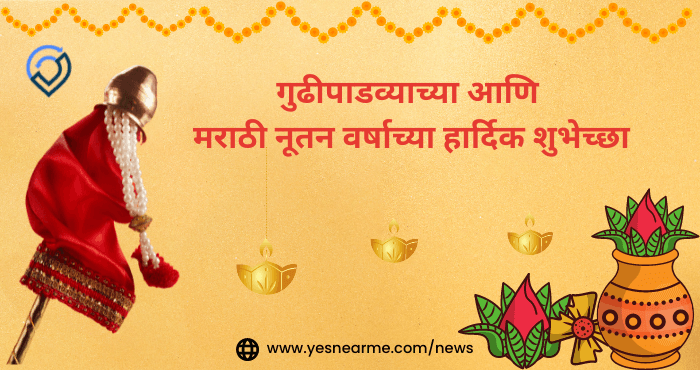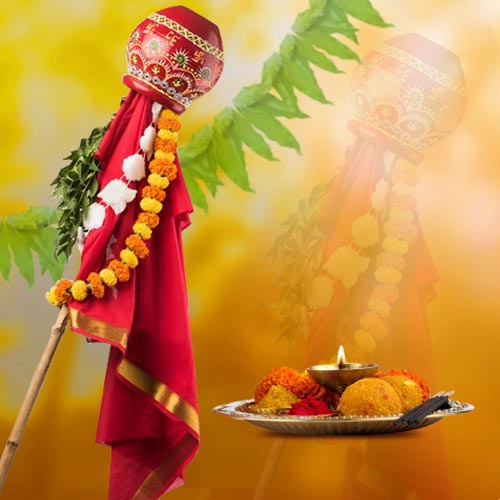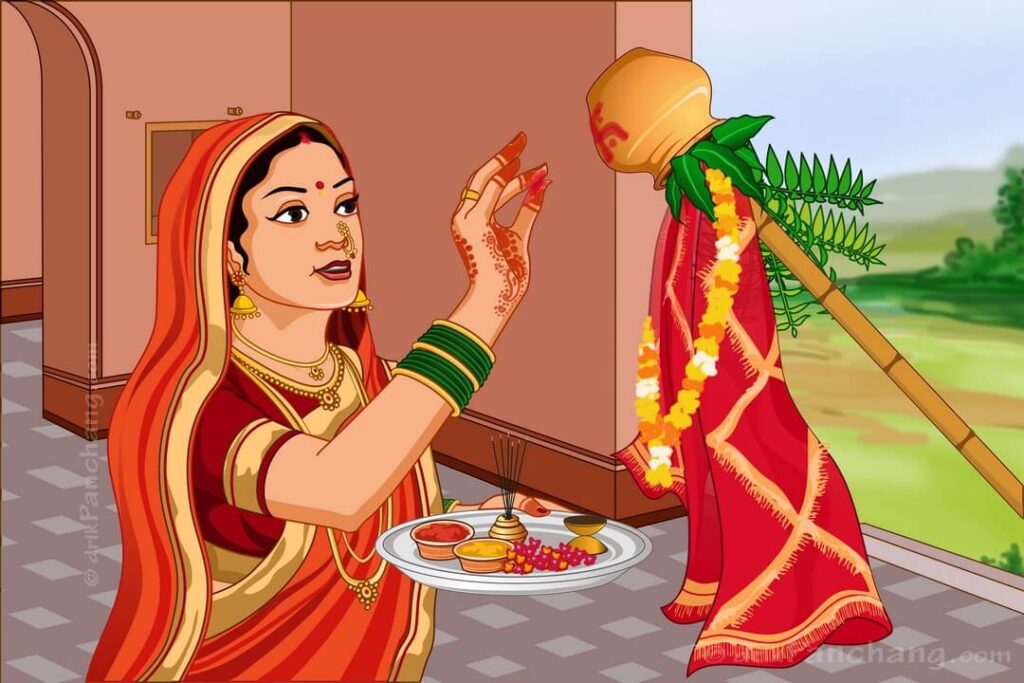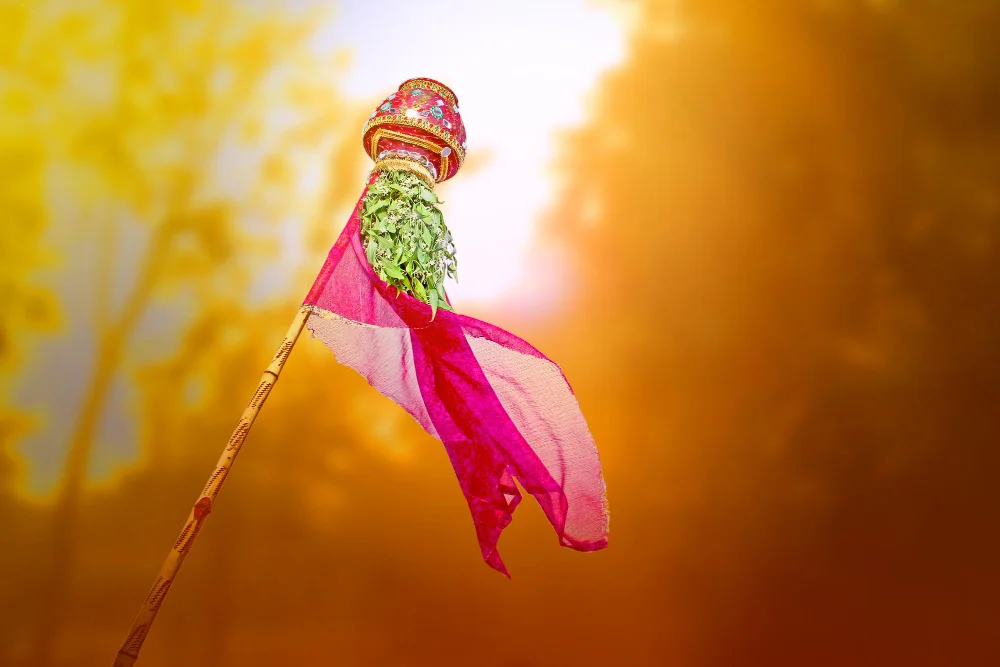
Table of Contents
Gudi Padwa: The Auspicious Beginning of a New Year

Gudi Padwa, a vibrant and culturally rich festival, marks the beginning of the traditional Hindu New Year in Maharashtra. Celebrated on the first day of the Chaitra month as per the Hindu lunisolar calendar, Gudi Padwa is an occasion filled with joy, devotion, and prosperity. The festival coincides with Ugadi in Karnataka and Andhra Pradesh, Cheti Chand for the Sindhi community, and Navreh in Kashmir, symbolizing the onset of spring and the harvest season.
The name ‘Gudi Padwa’ is derived from two words: ‘Gudi,’ referring to the sacred flag or banner that is hoisted on this day, and ‘Padwa,’ which denotes the first day of the lunar fortnight. This festival is not only a religious observance but also a cultural and social celebration that strengthens familial bonds and community spirit. People welcome the new year with enthusiasm, believing it to be an auspicious time for new beginnings, prosperity, and success. Homes are adorned with vibrant decorations, markets buzz with festive energy, and the air is filled with the aroma of delicious traditional sweets, making Gudi Padwa a truly enchanting festival that captures the essence of Maharashtra’s rich heritage.
Historical and Mythological Significance of Gudi Padwa
Gudi Padwa, the traditional New Year celebrated in Maharashtra and parts of India, holds deep historical and mythological importance. Rooted in Hindu traditions, this festival marks the beginning of the Chaitra month and is believed to bring prosperity, happiness, and success.
Mythological Significance
According to Hindu mythology, Gudi Padwa is associated with several divine events that highlight its importance as a day of renewal and victory. One of the most prominent legends linked to this festival is the coronation of Lord Rama in Ayodhya. After defeating the demon king Ravana and completing his 14-year exile, Lord Rama returned to his kingdom, where the people of Ayodhya welcomed him with grand celebrations. The tradition of hoisting the ‘Gudi’—a decorated flag symbolizing victory and prosperity—is believed to represent this joyous occasion.
Another significant mythological connection of Gudi Padwa is with Lord Brahma, the creator of the universe. According to Hindu scriptures, this day marks the moment when Lord Brahma manifested time and began the process of creation. It is said that he created the world and established the principles of life and dharma on this auspicious day. The celebration of Gudi Padwa, therefore, represents not just a new year but also a cosmic renewal, encouraging people to embrace fresh beginnings with positivity and enthusiasm.
Historical Significance
Beyond mythology, Gudi Padwa has strong historical roots, particularly in Maharashtra. The festival is closely linked with the legendary Maratha ruler, Chhatrapati Shivaji Maharaj, who is known for his valor, strategic brilliance, and establishment of the Hindavi Swarajya. Historical accounts suggest that the tradition of hoisting the Gudi was popularized by Shivaji Maharaj and his followers to symbolize victory in battles. Every time he conquered a fort or won a war, his soldiers would raise the Gudi as a mark of triumph and sovereignty. This tradition continues today, reminding people of the Maratha spirit of courage, resilience, and self-rule.
Additionally, Gudi Padwa is a celebration of agrarian prosperity. It marks the end of the Rabi harvest season, bringing joy to farmers as they reap the rewards of their hard work. The festival signifies gratitude towards nature and the beginning of a new agricultural cycle, making it an important event for rural communities.
Rituals and Traditions of Gudi Padwa

Gudi Padwa is celebrated with immense enthusiasm across Maharashtra, with various customs and rituals that add to its grandeur and significance. The festival marks the beginning of the Hindu New Year and is observed with devotion, joy, and cultural pride.
Raising the Gudi
The most significant tradition of Gudi Padwa is the hoisting of the ‘Gudi,’ a decorative arrangement that symbolizes victory, prosperity, and protection from negative energies. The Gudi consists of a bright silk cloth, usually in yellow, green, or red, tied to the top of a bamboo stick. It is further adorned with neem leaves, mango leaves, marigold flowers, and an inverted silver or copper pot, which signifies success and divine blessings. The Gudi is prominently displayed at the entrance of homes or on balconies, ensuring that it is visible to all, as it is believed to ward off evil and bring good fortune.
Oil Bath and New Clothes
The day of Gudi Padwa begins with an auspicious oil bath, which is considered to cleanse the body and mind, preparing individuals for a fresh start to the New Year. People wear new traditional clothes to mark the festivity. Women drape themselves in elegant sarees, often in vibrant colors, accompanied by traditional jewelry, while men don kurta-pajamas and a saffron-colored turban known as ‘Pheta,’ which signifies cultural pride and festivity.
Rangoli Decorations
Homes are decorated with intricate and colorful rangoli patterns at doorsteps, crafted using powdered colors, rice flour, and flowers. These artistic designs are created to welcome prosperity and happiness into the household. The use of bright colors and floral arrangements enhances the festive atmosphere and spreads positivity.
Special Prayers and Offerings
Gudi Padwa is a day of spiritual significance, and devotees visit temples to seek divine blessings for a prosperous year ahead. Special prayers and pujas are performed at home, often involving the recitation of holy scriptures and offerings of sweets and fruits to the deities. Families come together to perform these rituals, strengthening their spiritual and familial bonds.
Festive Delicacies
Food plays an integral role in the celebration of Gudi Padwa. A variety of traditional delicacies are prepared to mark the occasion, each dish carrying symbolic meaning. The most popular sweet dish is Puran Poli, a flatbread stuffed with a sweet filling of jaggery and chana dal. Another widely enjoyed delicacy is Shrikhand with Poori, a creamy dessert made from strained yogurt and flavored with cardamom and saffron. Additionally, a mixture of neem leaves, jaggery, and tamarind is consumed, signifying the balance of different flavors in life—bitter, sweet, and sour—representing the various experiences one encounters throughout the year.
These vibrant rituals and traditions make Gudi Padwa a cherished festival, celebrated with devotion, joy, and cultural pride, ushering in prosperity and happiness for the year ahead.
Cultural and Social Celebrations of Gudi Padwa

Gudi Padwa is not just a religious festival but a grand cultural celebration that brings communities together in joyous festivities. The day is marked by vibrant traditions, social gatherings, and an atmosphere of happiness and renewal. Maharashtra, in particular, sees a spectacular display of heritage and festivity, with cities and villages coming alive with music, dance, and colorful processions.
Traditional Festivities and Community Celebrations
One of the most striking aspects of Gudi Padwa celebrations is the grand processions that take place in various cities and towns across Maharashtra. These processions, known as Shobha Yatras, showcase Maharashtra’s rich cultural heritage and include performances of traditional folk dances, such as Lezim, a rhythmic dance performed with small jingling cymbals, and Dhol-Tasha, where large drums and percussion instruments create an electrifying atmosphere. These energetic performances symbolize strength, unity, and joy, captivating both participants and onlookers.
In some regions, people dress in traditional Maharashtrian attire to participate in these grand celebrations. Women often wear Nauvari sarees (a nine-yard saree draped in a warrior-like style), while men adorn themselves in Kurta-Pyjama with Pheta (a turban). These processions are not just about entertainment but also a way of preserving and promoting the cultural identity of Maharashtra.
Beyond the processions, people decorate their homes with rangoli—intricate and colorful patterns created on the floor using powdered dyes, flowers, or rice flour. Mango leaves and marigold flowers adorn doorways, symbolizing prosperity and happiness. The most significant tradition is the hoisting of the Gudi, a bright silk cloth tied to a bamboo stick with neem leaves, mango leaves, and a garland of flowers. The Gudi is topped with an inverted silver or copper pot and displayed outside homes, representing victory, good fortune, and divine blessings.
Family Traditions and Festive Feasts
Gudi Padwa is a time for families to come together, strengthen bonds, and celebrate new beginnings. The day typically begins with an early morning ritualistic oil bath, followed by prayers and offerings to deities. Families gather to prepare and enjoy a special festive meal that includes traditional Maharashtrian delicacies.
A signature dish of the festival is Shrikhand-Puri, a sweetened yogurt dessert served with deep-fried bread. Another traditional item is Puran Poli, a sweet flatbread stuffed with a mixture of jaggery and lentils. Additionally, families consume a special mixture of neem leaves, jaggery, and tamarind, which symbolizes the balance of life’s experiences—bitter, sweet, and sour—signifying that one must embrace both joys and challenges with equal grace.
Exchanging sweets and gifts is another cherished tradition. People visit relatives and friends, sharing festive delicacies and spreading goodwill. The festival fosters a sense of unity and harmony within communities, reinforcing the importance of relationships and togetherness.
Gudi Padwa as a Symbol of New Beginnings
Gudi Padwa has long been regarded as a festival that signifies renewal, prosperity, and the start of something auspicious. While its traditional roots lie in mythology and cultural heritage, in recent years, it has also evolved into an important occasion for making significant life and financial decisions. The festival serves as a reminder that every new beginning should be approached with optimism, faith, and a sense of purpose.
Auspicious Beginnings for Businesses and Careers
Many individuals and families consider Gudi Padwa an ideal day to embark on new professional and entrepreneurial ventures. Entrepreneurs often choose this occasion to inaugurate new shops, launch startups, or expand their businesses, believing that beginning on this auspicious day will bring prosperity and long-term success. Offices, commercial spaces, and retail establishments are frequently opened with special prayers and rituals to seek divine blessings for a flourishing future.
For professionals, Gudi Padwa is seen as an excellent time to begin new job roles, sign contracts, or pursue career advancements. Many people submit job applications, negotiate deals, or take the first steps toward achieving their professional goals, as the festival symbolizes positive momentum and opportunities.
Investment and Financial Growth
Gudi Padwa is also considered a highly favorable day for financial investments. People believe that investments made on this day yield better returns and long-term stability. As a result, stock market investments, mutual fund purchases, and other financial commitments often see a rise during the festival.
Additionally, many individuals and families purchase gold, silver, or other valuable assets on Gudi Padwa, as it is believed that acquiring wealth on this day ensures continued prosperity. Jewelry stores often witness a surge in demand, with customers investing in precious metals as a symbol of good fortune.
Real Estate and Property Acquisitions
Real estate transactions, including buying new homes, commercial properties, or land, are another common practice during Gudi Padwa. The festival is considered an auspicious time for conducting housewarming ceremonies (Griha Pravesh) and moving into new residences. Builders and developers often introduce new housing projects, offering special deals and discounts to encourage homebuyers to make their purchases on this special day.
Many people also book apartments, lay foundation stones for new construction projects, or finalize property agreements, believing that starting a new chapter in real estate on Gudi Padwa will bring long-term stability and happiness.
Purchasing Vehicles and Major Assets
Gudi Padwa is also a popular time for purchasing new vehicles, including cars, two-wheelers, and commercial transport. Automobile showrooms witness a spike in sales as people believe that acquiring a vehicle on this day ensures safety, good fortune, and a smooth journey ahead. Many buyers perform traditional pujas (prayers) for their new vehicles, decorating them with flowers and applying turmeric and vermillion to seek blessings for a safe and prosperous future.
New Beginnings in Personal Life
Beyond business and financial endeavors, Gudi Padwa is also considered a perfect occasion for important personal milestones, such as marriages, engagements, and new relationships. Many couples choose this day for their wedding ceremonies, believing that a marriage started on Gudi Padwa will be filled with harmony and prosperity.
Additionally, families often use this day to make significant life decisions, such as starting educational pursuits, enrolling children in schools, or planning for higher studies abroad. It is a time when parents bless their children and encourage them to embark on new academic journeys with determination and positivity.
Spiritual and Emotional Renewal
Gudi Padwa is not just about material prosperity—it is also a time for spiritual and emotional rejuvenation. Many people take this opportunity to set new goals, adopt healthier lifestyles, and cultivate positive habits. Whether it is starting a new fitness regimen, practicing mindfulness, or committing to personal growth, the festival serves as a reminder that every day is a chance for renewal and self-improvement.
Additionally, many individuals participate in charitable activities, donating food, clothes, or money to the underprivileged. Acts of kindness and generosity on this day are believed to bring divine blessings and inner fulfillment.
Gudipadwa Quotes and Messages-
- Happy Gudi Padwa! May the festival of lights be the harbinger of joy and prosperity.
- Gudi Padwa, May you be blessed with happiness, prosperity, and success.
- A new hope, a new beginning, a new dream is waiting to unfold. May this New Year brings your way, millions of joys unheard.
- The fortunate is the one who has learned to Admire but not to envy. Good Wishes for a joyous Gadi Padwa and a Happy New Year with plenty of Peace and Prosperity.
- May this Gudi Padwa bring you a new spirit, a new beginning, and new Prosperity
- Sweet and Sour, here I’m wishing you luck, in every aspect of life. This Gudi Padwa and always.
- May the light that we celebrate at Gudi Padwa show us the way and lead us together on the path of peace and social harmony.
- Long live the tradition of Hindu culture and as the generations have passed by Hindu culture is getting stronger and stronger let’s keep it up.
- Find new avenues of success and may your life be fulfilling. Happy Gudi Padwa!
- No celebration is incomplete with the love and blessings of family and I wish we all have the best of Gudi Padwa celebrations with each other.
Gudi padwa Messages –
- नया दिन, नयी सुबह
चलो मनाये एक साथ
है यही गुड़ी का पर्व
दुआ करे सदा रहे हम साथ साथ.
- पिछली यादे गठरी में बांधकर
करे नये वर्ष का इंतज़ार
लाये खुशियों की बरात
ऐसी हो गुड़ी पड़वा से परम्परागत शुरुवात.
- वृक्षों पर सजती नये पत्तों की बहार
हरियाली से महकता प्रकृति का व्यवहार
ऐसा सजता हैं गुड़ी का त्यौहार
मौसम ही कर देता नववर्ष का सत्कार
गुड़ी पड़वा की बधाई.
- चारों तरफ हो खुशियाँ ही खुशियाँ
मीठी पुरनपोली और गुजियाँ ही गुजियाँ
द्वारे सजती सुंदर रंगोली की सौगात
आसमान में हर तरफ पतंगों की बारात
सभी को शुभ को नव वर्ष हर बार.
- खुशियां हो ओवरफ्लो
मस्ती कभी न हो लो
धन और शोहरत की हो बौछार
ऐसा आये आपके लिए गुड़ी पड़वा का त्यौहार
गुड़ी पड़वा की हार्दिक शुभकामनाएं
Quotes in Marathi-
- नवीन पल्लवी वृषलतांची, नवीन आशा नववर्षाची, चंद्रकोरही नवीन दिसते, नवीन घडी ही आनंदाची, गुढीपाडव्याच्या शुभेच्छा.
- नूतन वर्ष आणि गुडी पाढव्याच्या हार्दिक शुभेच्छा. हे वर्ष सर्वांच्या जीवनात आनंद, सुख, समृद्धी, निरामय आरोग्य आणि प्रेम घेऊन येवो हीच ईश्वर चरणी प्रार्थना.
- नव्या वर्षात आपल्या सर्वांच्या स्वप्नांना मिळो नवी भरारी, आयुष्याला लाभो तेजोमयी किनार, हीच सदिच्छा…नववर्षाच्या निमित्ताने आज .
- पडता दारी पाऊल गुढीचे, आनंदी आणि मांगल्यमय होई जग सारे, या सणाला करू आनंदाचा जल्लोष कारण आले आहे हिंदू नववर्ष.
- वसंताची चाहूल घेऊन येते नववर्ष सर्वांच्या मनात या निमित्ताने पुन्हा होऊ दे हर्षनववर्षाच्या चैतन्यमय शुभेच्छा.
- यंदाही दिली नाही कोरोनाने भेटीची परवानगीलांब राहून आपणही करूया त्याची रवानगी गुढीपाडव्याच्या खूप खूप शुभेच्छा.
- ऋतूने बदलतं हिंदू वर्ष..नवं वर्ष येताच येते बहार..सगळीकडे दिसतो हा सुंदर बदल..असं असतं नववर्षाचं हे पर्व.
- गुढी उभारली असेल आज तुमच्याही दारी, चैतन्य आहे आज सर्वदारी…चला उत्साहाने साजरा करू नववर्षाचा हा आनंदोत्सव.
- नक्षीदार काठाचे रेशमी वस्त्र, चांदीचा तांब्या, कडुनिंबाची पानं, साखरेची माळ, अशी उभारूया समृद्धीची गुढी.
- पुन्हा होईल सर्व सुरळीत सांगत आहे नववर्ष दूर होईल मनावरचं मळभ आणि होईल हर्ष आनंदी राहा आणि गुढीपाडवा साजरा करा.
Conclusion
Gudi Padwa is a festival that embodies the spirit of new beginnings, resilience, and cultural heritage. It marks the onset of spring and the start of a new year, symbolizing renewal, hope, and prosperity. Whether through its historical significance, vibrant rituals, or delicious festive foods, the day holds deep meaning for Maharashtrians and Hindu communities across India.
Beyond its religious and cultural essence, Gudi Padwa also fosters unity and togetherness among families and communities. As loved ones gather to raise the Gudi, share festive meals, and partake in traditional customs, the festival serves as a reminder of victory over adversity, the importance of gratitude, and the promise of a bright and prosperous future. The celebrations not only honor the past but also inspire individuals to embrace the coming year with optimism, enthusiasm, and a renewed sense of purpose. In essence, Gudi Padwa is not just a festival—it is a celebration of life, culture, and the unwavering spirit of renewal.
For More Info You Can Visit Here .
Want to read more articles like this? Explore now!
